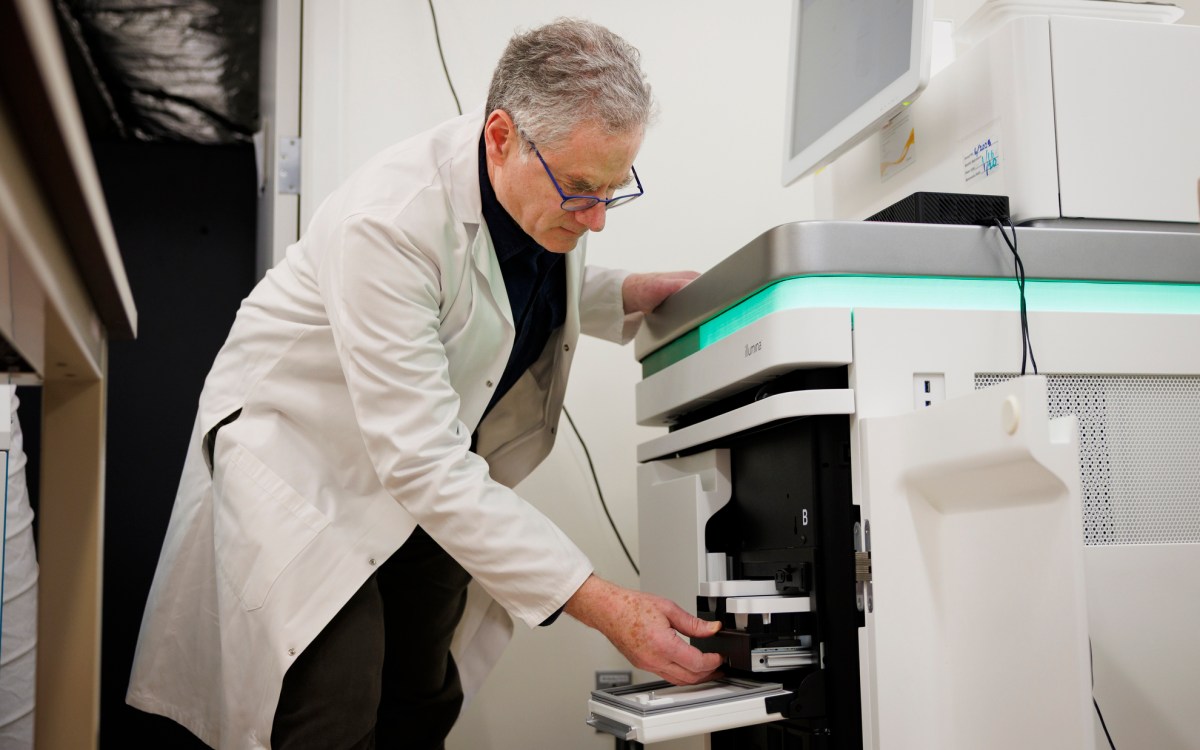Health
-

Pricey blockbuster GLP-1s are costing users — and most of the rest of us, too
Health insurers are passing along cost for coverage in form of higher rates across the board, policy researcher says
-

Drinking 2-3 cups of coffee a day tied to lower dementia risk
Caffeinated tea also found to slow cognitive decline in study

-

New AI tool predicts brain age, dementia risk, cancer survival
Unlike other AI models, BrainIAC needs limited data to ID key neurological health indicators

-

It’s time to get more comfortable with talking about dying
Palliative care physicians offer advice for end-of-life conversations between patients, loved ones
-

Turns out inherited eye diseases aren’t a sure thing
Study finds only fraction of those with mutated gene develop malady — a finding that could lead to better treatments (and could apply to other such illnesses)
-

How smoking divides America
Mapping the midlife effects of a lethal habit
-
New findings about protection against pneumococcal disease
Before the advent of the pneumococcal vaccine, known as Prevnar, S. pneumoniae caused millions of ear infections each year, half a million episodes of bacterial pneumonia, and life- threatening cases…
-
Joslin Diabetes Center scientists find genetic defects in immunological tolerance
The genetic defect keeps the body from properly dealing with “errant” immune cells that it normally eliminates by a process called immunological tolerance. These immune cells then attack the insulin-producing…
-
Researchers find better way to predict stroke risk in sickle cell anemia patients
Researchers from Children’s Hospital Boston, Boston University School of Public Health (BUSPH), Boston University School of Medicine (BUSM), Boston Medical Center (BMC) and Harvard Medical School have developed a novel…
-
High cholesterol levels accelerate growth of prostate cancer
The findings, published in the April 1, 2005 issue of the Journal of Clinical Investigation, are in keeping with population studies that have linked prostate cancer with high cholesterol levels.…
-
Explosion of child obesity predicted to shorten U.S. life expectancy
A review by obesity researcher David Ludwig of Children’s Hospital Boston, epidemiologist S. Jay Olshansky of the University of Illinois at Chicago, and colleagues concludes that obesity now reduces average…
-
Preventive removal of both breasts reduces chance of breast cancer in women at elevated risk
“Prophylactic mastectomy appears very effective in preventing breast cancer but choosing this procedure is a complex decision,” said Ann M. Geiger, PhD, lead author of the study. “Prophylactic mastectomy prevents…
-
Weight status of children ages 8 to 15 predicts obesity and high blood pressure in adulthood
“We have known that kids who are overweight or obese have a higher risk for being overweight or obese as adults. But in this paper, we show that even children…
-
Largest twin study of age-related macular degeneration finds genetics and environment play large role in disease
Researchers led by Johanna M. Seddon, M.D., at the Massachusetts Eye and Ear Infirmary, Harvard Medical School and Harvard School of Public Health conducted the largest study of twins of…
-
Protein packages activate genes
It’s all in the packaging. How nature wraps and tags genes determines if and when they become active, according to researchers from Harvard and M.I.T. They did the largest, most…
-
Poor prenatal nutrition permanently damages function of insulin-producing cells in the pancreas
To understand the increased risk factor, the researchers mated ordinary mice and separated the mothers into a control group that ate as much chow as they wanted throughout their pregnancies…
-
Urine test tracks deadly birthmarks
Although not yet approved by the Food and Drug Administration, results from simple urine tests are already being used to guide treatment of children with disfiguring birthmarks and adults with…
-
Key to dental enamel formation found
Scientists at Harvard-affiliated Forsyth Institute have found and replicated a key aspect of the mechanism by which dental enamel is formed. The findings, published in the Feb. 14 Journal of…
-
Schepens scientists regenerate optic nerve for the first time
In earlier research, Dr. Dong Feng Chen, lead author of the study, assistant scientist at Schepens Eye Research Institute and an assistant professor of ophthalmology at Harvard Medical school, and…
-
How often should women get mammograms?
With screening guidelines and financial coverage varying among health systems and insurers – sometimes dramatically – a new mathematical model provides quantitative predictions of the mortality benefits, on average, in…
-
Long-term Celebrex use increases cardiovascular event risk
The findings prompted the suspension of Celebrex within the Adenoma Prevention with Celecoxib (APC) Trial, in which participants were to take celecoxib or placebo for three years. “These data suggest…
-
Older doctors less likely to follow current standards of care
The study included a review of previously published papers with a large sample size of doctors. These studies included measures of physician knowledge or quality of care as well as…
-
Food ingredients may be as effective as antidepressants
Researchers report that omega-3 fatty acids and uridine, two substances in foods such as fish, walnuts, molasses, and sugar beets, prevented depression in rats as effectively as antidepressant drugs. “Giving…
-
Phobic anxiety increases risk of sudden cardiac death in women
According to lead author Christine M. Albert, M.D., M.P.H., an epidemiologist at BWH and an electrophysiologist and cardiologist at MGH, “Phobic anxiety is associated with coronary heart disease risk factors.…
-
Weight and weight gain may predict breast cancer survival
The study included 5,204 women with invasive breast cancer who were between the ages 30 to 55 when enrolled in the study in 1976. The researchers found that women who…
-
Scientists discover “master switch” that triggers insulin resistance and type 2 diabetes
“We zeroed in on a factor called NF-kB,” said principal investigator Steven E. Shoelson, M.D., Ph.D., Helen and Morton Adler Chair and head of the Section on Cellular and Molecular…
-
Study says women don’t experience pain, anxiety during mammograms
“I think it’s an old wives tale that mammograms hurt,” says the study’s lead author, Alice Domar, PhD, director of the Mind/ Body Center for Women’s Health at Boston IVF…
-
Snaring secrets of the Venus flytrap
While “speed” is not a word most people associate with the plant kingdom, the Venus flytrap closes its v-shaped leaves in just one-tenth of a second – fast enough to…
-
Weight gain and obesity linked to higher risk of kidney stones
“Our study demonstrated that multiple measures of larger body size, including larger waist circumference, higher weight, and higher body mass index, were related to an elevated risk of kidney stones,”…
-
Solving the mystery of a centuries-old plague
Edward O. Wilson identified two different ant species in investigating the mystery of centuries-old plagues, a tropical fire ant in the early 1500s and an introduced African ant in the…
-
Safer cigarettes would cut fire deaths if made available
Researchers at Harvard School of Public Health, funded by the American Legacy Foundation, compared the physical properties of cigarettes sold in New York with cigarettes of the same brands sold…
-
First view of many neurons processing information in living brain
A Harvard Medical School (HMS) research team used a new technique to obtain the first close-up look at the neural circuits that produce vision in cats and rats. “Put simply,…
-
One alcoholic drink per day improves cognitive function among older women
According to the study’s senior author, BWH’s Francine Grodstein, Sc.D., “Much evidence has demonstrated the heart benefits of light alcohol drinking, but less research has focused on cognitive functioning. While…
-
Monitoring system needed to prevent safety hazard of problem physicians
Asserting that “physician performance failures are not rare and pose substantial threats to patient welfare and safety,” experts in medical error are calling on state medical boards and healthcare organizations…
-
Findings recommend herpes vaccine for human trials
Research published in the January 2005 Journal of Virology compared three different experimental vaccines for herpes simplex virus 2 (HSV-2), which causes most cases of genital herpes. Lead author Stephen…
-
Disparate proteins structurally identical
Gerhard Wagner, the Elkan Blout professor of biological chemistry and molecular pharmacology, and Tucker Collins, the S. Burt Wolbach professor of pathology at Harvard Medical School and Children’s Hospital, made…


